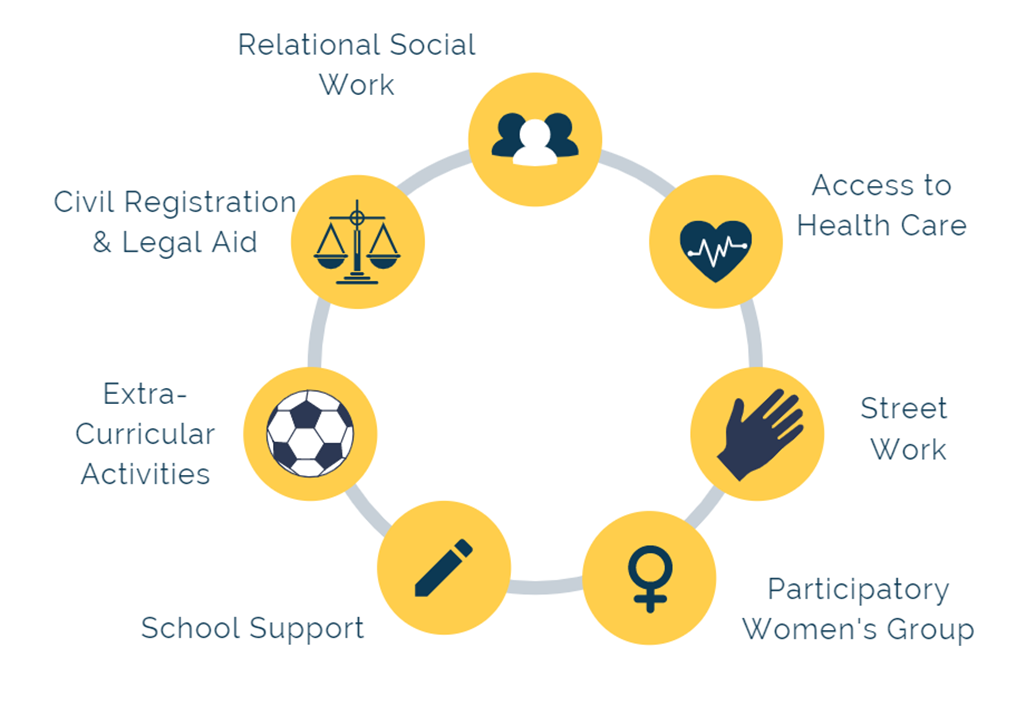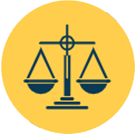With the support of MCT, since 2009 Centre Amane has supported children and their families living in Taroudant by providing holistic social support services. Rather than focusing solely on “the child”, the social work ethos of Centre Amane is to work alongside the family – one step at a time, and together at every stage. Since 2021, we are happy to also have received the support of the Ministry of Solidarity, Women, Family & Social Development.
Centre Amane programmes ensure caregivers have the capacity to care for their children independently. Through our safeguarding practices, we keep families together by providing the support required for them to stay together. We continuously draw on our 5 pillars to provide holistic social services to children and families consisting of:

.
 Relational social work is about being a friend for those in society who may find it difficult to create and sustain friends. Therefore, our social workers ensure they are able to be a friend for the children and families who are at Centre Amane.
Relational social work is about being a friend for those in society who may find it difficult to create and sustain friends. Therefore, our social workers ensure they are able to be a friend for the children and families who are at Centre Amane.
 Social workers connect and often accompany children and families to visit medical practitioners and access basic health services through obtaining RAMED.
Social workers connect and often accompany children and families to visit medical practitioners and access basic health services through obtaining RAMED.
 During street work our social workers simply walk the set locations and build informal relationships with community members, store owners, and the many children who play, work, and inhabit the street. Children who are identified at-risk of meeting or do meet our entry points are signalled to the social work team and processed through our referral system.
During street work our social workers simply walk the set locations and build informal relationships with community members, store owners, and the many children who play, work, and inhabit the street. Children who are identified at-risk of meeting or do meet our entry points are signalled to the social work team and processed through our referral system.
 Many caregivers at Centre Amane are single mothers who experience social stigma as a consequence of poverty, involvement in taboo work, and substance use amongst other factors. Fundamentally, being a single mother is difficult when forced to face those challenges on your own. The Participatory Women’s Group is a safe space for women of different ages, backgrounds, and experiences to come together and share and learn each other’s stories. Significantly, the Participatory Women’s Group is guided by our all-encompassing participatory approach that means weekly topics are informed by the women and may range from workshops with local trainers on topics such as sexual health and parenting, to activities like dancing, sewing, and cooking, or trips to local attractions or restaurants.
Many caregivers at Centre Amane are single mothers who experience social stigma as a consequence of poverty, involvement in taboo work, and substance use amongst other factors. Fundamentally, being a single mother is difficult when forced to face those challenges on your own. The Participatory Women’s Group is a safe space for women of different ages, backgrounds, and experiences to come together and share and learn each other’s stories. Significantly, the Participatory Women’s Group is guided by our all-encompassing participatory approach that means weekly topics are informed by the women and may range from workshops with local trainers on topics such as sexual health and parenting, to activities like dancing, sewing, and cooking, or trips to local attractions or restaurants.
 we provide a safe and secure environment for children to attend the centre and, therefore, spend less time unsupervised and potentially on the streets. This service entails a tutoring service and supervised activities for children for four hours each day – two hours in the morning and two hours in the afternoon. We also follow-up on children’s schooling through regular meetings with their teachers.
we provide a safe and secure environment for children to attend the centre and, therefore, spend less time unsupervised and potentially on the streets. This service entails a tutoring service and supervised activities for children for four hours each day – two hours in the morning and two hours in the afternoon. We also follow-up on children’s schooling through regular meetings with their teachers.
 The development of social skills is an important aspect of a child’s development. Many families are unable to afford to provide their children with access to extracurricular activities, which means children are unable to develop team building skills, discover and foster their talents, learn about the significance and impact of having dedication and practice, and success and failure amongst other valuable life skills. We support children to acquire the valuable social skills cultivated in extra-curricular activities by connecting them with associations in Taroudant providing formal activities such as: karate, judo, football, basketball, drama, and music.
The development of social skills is an important aspect of a child’s development. Many families are unable to afford to provide their children with access to extracurricular activities, which means children are unable to develop team building skills, discover and foster their talents, learn about the significance and impact of having dedication and practice, and success and failure amongst other valuable life skills. We support children to acquire the valuable social skills cultivated in extra-curricular activities by connecting them with associations in Taroudant providing formal activities such as: karate, judo, football, basketball, drama, and music.
 The lack of an official identity card – Civil Registration – affects almost every aspect of the lives of unregistered Moroccan children. It condemns them to a lifetime of secondary citizenship, unable to access social services entitled to them by birth, such as education, social and health services, official employment, and the ability to travel overseas. The Civil Registration service is fundamental to our holistic and transitional service as it allows children and families to gain access to social entitlements and future opportunities helping to break the cycle of poverty. It means children are able to be enrolled in school, access government subsidised health care (RAMED), and enter employment when they come of age.
The lack of an official identity card – Civil Registration – affects almost every aspect of the lives of unregistered Moroccan children. It condemns them to a lifetime of secondary citizenship, unable to access social services entitled to them by birth, such as education, social and health services, official employment, and the ability to travel overseas. The Civil Registration service is fundamental to our holistic and transitional service as it allows children and families to gain access to social entitlements and future opportunities helping to break the cycle of poverty. It means children are able to be enrolled in school, access government subsidised health care (RAMED), and enter employment when they come of age.